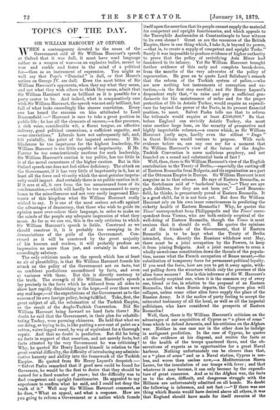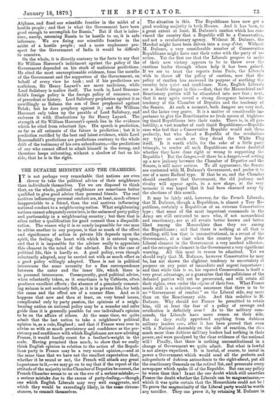TOPICS OF THE DAY.
SIR WILLIAM HARCOURT AT OXFORD.
WHEN a contemporary devoted to the cause of the Government said of Sir William Harcourt's speech at Oxford that it was dull, it must have used language rather as a weapon of war—as an explosive bullet, meant to tear and rankle and fester in the mind of a political foe—than as an instrument of expression. You might as well say that Pope's "Dunciad " is dull, or that Moore's satires on George IV. are dull. Even the most bitter of Sir William Harcourt's opponents, when they say what they mean, and not what they wish others to think they mean, admit that Sir William Harcourt was as brilliant as it is possible for a party orator to be. And indeed, what is comparatively rare with Sir William Harcourt, the speech was not only brilliant, but full of what looks exceedingly like sincere conviction. Every one has heard the sarcasm on him attributed to Lord Beaconsfield :—" Harcourt is sure to take a great position in public life ; he has all the elements of success,—a fine presence, a rich voice, considerable wit, a fluent tongue, an effective delivery, good political connexions, a sufficient sagacity, and —no convictions." Liberals have not unfrequently felt, and, felt painfully, the point of the imputed sarcasm. If Mr. Gladstone be too impetuous for the highest leadership, Sir William Harcourt is too little capable of impetuosity. If Mr. Forster be too conscientiously cautious for such leadership, Sir William Harcourt's caution is too politic, has too little in it of the moral earnestness of the higher caution. But in this Oxford speech one does not feel either deficiency. The attack on the Government, if it has very little of impetuosity in it, has at least all the force and vivacity which the most genuine impetu- osity could impart. And certainly there is no politic caution in it. If it errs at all, it errs from the too unmeasured force of its condemnation,—which will hardly be too unmeasured to carry home to the miscellaneous and not very easily impressed Elec- torate of this kingdom what Sir William Harcourt really wished to say. It is one of the most serious set-offs against the advantages of democracy, that those who wish to guide its opinion must over-colour their language, in order to make on the minds of the people any adequate impression of what they mean. As far as we can see, this is the only criticism to which Sir William Harcourt's speech is liable. Construed as we should construe it, it is probably too sweeping in its denunciations of the guile of the Government. Con- strued as it will be construed by the great majority of his hearers and readers, it will probably produce an impression no more than just, and certainly in that case, exceedingly salutary. The only criticism made on the speech which has at least an air of plausibility, is that Sir William Harcourt founds his attack on the policy of the Government not on facts, but on confident predictions unconfirmed by facts, and even at variance with them. But this is directly contrary to the truth. The strength of Sir William Harcourt's speech lay precisely in the facts which he adduced from all sides to show how rapidly diminishing is the hope,—if ever there were any real hope,—of the expectations of the Government as to the success of its own foreign policy, being fulfilled. Take, first, the great subject of all, the reformation of the Turkish Empire, as the result of the Anglo-Turkish Convention. Did Sir William Harcourt bring forward no hard facts there I No doubt he said that the Government, in their plan for rehabili- tating Turkey, were pursuing chimeras. He held that what we are doing, or trying to do, is like putting a new coat of paint on a rotten, water-logged vessel, by way of equivalent for a thorough repair. And that no doubt is prediction. But did he bring no facts in support of that assertion, and not merely facts, but facts attested by the very Government he was criticising f Why, he quoted Sir Henry Layard himself in relation to the great central difficulty, the difficulty of introducing any adminis- trative honesty and ability into the framework of the Turkish Empire. He quoted from Sir Henry Layard's despatch :- "Safvet Pasha remarked that if good men could be found for Governors, he would be the first to desire that they should be named for a fixed number of years ; but the difficulty was to find competent and upright functionaries. He appealed to my experience to confirm what he said, and I could not deny the truth of it." Well may Sir William Harcourt comment, as he does, " What an appeal, and what a response. How are you going to reform a Government or a nation which founds itself upon the assertion that its people cannot supply the material for competent and upright functionaries, and which appeals to the Turcophile Ambassador at Constantinople to bear witness to its own shame ? Great as are the resources of the British Empire, there is one thing which, I take it, is beyond its power, —that is, to create a supply of competent and upright Turks." Surely it was impossible to produce evidence of higher authority to prove that the policy of revivifying Asia Minor had foundered in its infancy. Yet Sir William Harcourt brought further evidence of this early and complete break-down, from the mouths of the very advocates of the policy of regeneration. He goes on to quote Lord Salisbury's remark that the reform of the Turkish system of police,—who are now nothing but instruments of corruption and ex- tortion,—is the first step needful ; and Sir Henry Layard's despondent reply that, " to raise and pay a sufficient gen- darmerie for the maintenance of order and for the proper protection of life in Asiatic Turkey, would require an expendi- ture far beyond the power of the Porte, in its present financial position, to meet. Safvet Pasha tells me that to reform the tribunals would require at least £500,000." So that before England can revivify Asiatic Turkey, she must raise another large loan, on the security of prospective and highly improbable reforms,—a course which, as Sir William Harcourt justly says, hardly even the silliest " Jingo " in Great Britain would venture to propose. With such evidence before us, can any one say for a moment that Sir William Harcourt's view of the future of the Anglo- Turkish Convention is mere malicious prophecy, and not founded on a sound and substantial basis of fact ?
Well, then, there is Sir William Harcourt's view of the English contribution to the Treaty of Berlin,—especially the cutting-off' of Eastern Roumelia from Bulgaria, and its organisation as a part of the Ottoman Empire in Europe. Sir William Harcourt is not sanguine as to that scheme. He says of Eastern Roumelia, as the Scotchman said of " bachelors' bairns,"—" They are aye gude children, for they are not born yet." Lord Beacons- field, he thinks, is prematurely proud of Eastern Roumelia. It is a good child, for it is not born yet. But does Sir William Harcourt rely on his own inner consciousness in predicting the- ricketty health of Eastern Roumelia ? Why, he quotes the. Times' correspondent from Philippopolis and the Times' corre- spondent from Vienna, who are both entirely sceptical of the well-doing of Eastern Roumelia, though the Times is most anxious that it should do well. He quotes the opinions of all the friends of the Government., that if Eastern Roumelia is to be kept what the Treaty of Berlin intended, then, directly the Russians withdraw next May,. there must be a joint occupation by the Powers, to keep it from joining Bulgaria. And a joint occupation to cram a wholly unwelcome constitution down the throats of the popula- tion, means what the French occupation of Rome meant,—the- substitution of temporary force for permanent political loyalty. If you send the force, how are you to get it away again, with- out pulling down the structure which only the presence of this alien force secures ? Nor is this inference of Sir W. Harcourt's- a needlessly sceptical one, when it is the common cry of every one, friend or foe, in relation to the proposal of an Eastern Roumelia, that when Russia departs, the Congress plan will collapse, unless some other alien force supply the place of the Russian Army. Is it the malice of party feeling to accept the reiterated testimony of all the local, as well as all the imperial politicians, who have considered the prospects of Eastern Roumelia Well, then, there is Sir William Harcourt's criticism on the advantages of our acquisition of Cyprus as " a place of arms " from which to defend Armenia, and his criticism on the Afghan war. Neither in one case nor in the other does he indulge in malignant prediction. In the case of Cyprus, he quotes all the evidence at his disposal, and recites the facts as to the health of the troops quartered there, and the ob- servations of experts as to opportunities for a great Naval harbour. Nothing unfortunately can be clearer than that, as a " place of arms " and as a Naval station, Cyprus is use- less, and worse than useless now,—a Mediterranean Sierra Leone, for the inoculation of our troops with fever ; and that whatever it may become, it can only become by the expendi- ture of great resources. And as to the Afghan war, the facts as to the slow, difficult, and dangerous struggle with the Hillmen • are unfortunately admitted on all hands. No doubt the following is inference, and not fact :—" If there was one thing which Russia would have desired above all others, it was that England should have made for itself enemies of the Afghans, and fixed our scientific frontier in the midst of a hostile people ; and that is what the Government have been good enough to accomplish for Russia." But if that is infer- ence, surely, assuming Russia to be hostile to us, it is safe inference. We are fixing our scientific frontier in the midst of a hostile people ; and a more unpleasant pro- spect for the Government of India it would be difficult to conceive.
On the whole, it is directly contrary to the facts to say that Sir William Harcourt's indictment against the policy of the Government depended on his stock of malicious predictions. He cited the most unexceptionable evidence, from the mouths of the Government and the supporters of the Government, on behalf of every view he took ; and if his predictions are malicious, Sir Henry Layard's are more malicious, while Lord Salisbury is malice itself. The truth is, Lord Beacons- field's foreign policy is the foreign policy of romance, not of precedent or history. Lord Salisbury prophesies against it as unwillingly as Balaam the son of Beor prophesied against Balak; but he does prophesy against it ; and Sir William Harcourt only takes up the parable of Lord Salisbury, and enforces it with illustrations by Sir Henry Layard. The strength of Sir William Harcourt's speech lies in the evidence which he cited from reluctant lips. His speech is prediction, so far as all estimate of the future is prediction ; but it is prediction rectified by the best and latest evidence, while Lord Beaconsfield's predictions are predictions contrary to the whole drift of the testimony of his own subordinates,—the predictions of one who cannot afford to admit himself in the wrong, and therefore keeps reiterating, without a shadow of fact on his side, that he is in the right.



































 Previous page
Previous page